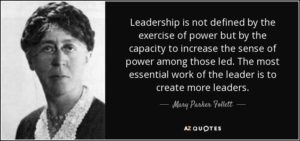“…as soon as I gave up the attempt to feel God in anyway, as soon as I gave myself wholeheartedly to the living of ordinary life and the experiencing of present experience, instantly there came what I can only describe as a true feeling of God.”
-Alan Watts in a letter to a former student (1943)
What’s in a legacy?
We should all hope to raise children who can see expansive meaning in the contributions we have made in our lives. Often the best way to interpret our life’s work is through the insights that one has into our personal journeys. Just another reason to keep on writing.
Unfortunately, we had some technical difficulties getting the audio of our guests today. The first segment was pretty powerful and I didn’t want to lose the entire segment, so below is the information based on the woman I spoke about:
Scholar: Mary Parker Follett (September 3, 1868 – December 18, 1933) was an American social worker, management consultant, philosopher, and pioneer in the fields of organizational theory and organizational behavior.

- What is the scholar known for?
Mary Parker Follet was known for being one of the more educated women of her time, a scholar, a leader in the community center movement, and a social advocate. As an author, she published The New State (1918) among other great works, which claimed that representative government was ineffective because intersectionality and contrasting ideas were not being willingly accepted or capitalized on. She believed that individual minds were to be esteemed and used collaboratively, rather than separated or mutually settled. Years later she amplified her ideas on social reality in Creative Experience (1924), which introduced the concept of “circular response.” (C. Stivers, 475) This proposed the importance of how people react to the whole connection of the relationship at large, and the importance of evaluating those transformations.
- How did his/her ideas fit into the management conversation of the day?
When her ideas were implemented, massive growth and new developments arose. This can be seen in her influence in social work, the community center movement, and when she became a national leader and educator for business leaders. In government, her ideas were often met with ridicule, beginning with her study of the office of the Speaker of the House of Representatives. She was criticized by Woodrow Wilson for her ideas conflicted with his in regards to his congressional proposal for the U.S.. The exception here was that years later Theodore Roosevelt came to value her ideas on “conflict resolution” and referred to her published work quite often. Thanks to his willingness to explore her ideas, Follette’s work eventually became a “landmark in literature.” (Stivers, 474)
- What has been the impact of this person’s ideas since the time of their writing?
There are many perspectives here. One being that her ideas are still unrealized and unappreciated. Follette devoted much of her life to advancing social thought and improving upon social reality. Her work was destroyed early on and only in the last few decades were her ideas rediscovered and seen with high value by scholars. Because her ideas are so different than many of the other management theorists, it almost requires a completely different way to think in order to perceive them. She valued human diversity and spent much of her life addressing the fear of human contrast – even in the face of values. In essence, she placed value on the very things that most leaders were seeing as a threat. Instead of encouraging compromise or middle-ground, she encouraged disagreements and arguments, because she believed that was was truly harmonized and fostered social expansion.
- How can you see these ideas in your own organizations today?
I was honestly thrilled with how relevant her work is in many conversations of today. First, as management styles are concerned, social values are often overlooked because of unconscious biases and the misconception that society functions better when following a narrow set of rules and mindset. As an activist and a feminist, I believe that we have spent decades limiting our social expansion because of our unwillingness to embrace something different or even unfamiliar. (If it ain’t broke, don’t fix it.) It didn’t at all feel like an accident that while I was studying the works of Follett, I was incredibly involved in the planning of the 2018 Los Angeles Women’s march. On so many levels, after centuries of oppression, women are realizing they have a valuable voice. Follett’s ideas were not accepted easily by government leaders in her day. There could be many reasons for this, one being that women were not seen as scholarly or having the ability to problem solve, so her ideas were rejected even before they were heard. Another reason could be that her ideas seemed outlandish and unrealistic- which also indicated a gap in female to male communication (although, that would be painfully ironic.) Overall, I see Follett as an icon with an extraordinary mind and a master in social influence. If there were ever a time to implement her ideas for the greater good and better management styles, it may just be this very moment in history.
Reference:
Integrating Mary Parker Follett and Public Administration Reviewed Work(s): Mary P. Follett: Creating Democracy, Transforming Management by Joan C. Tonn, by C. Stivers. (Public Administration Review, Vol. 66, No. 3, 2006), pp. 473-476

 How we are going to RE-HUMANIZE and win the war with one another
How we are going to RE-HUMANIZE and win the war with one another This Episode Has No Rules
This Episode Has No Rules The Powerful Global Feminine Shift… is FINANCIAL.
The Powerful Global Feminine Shift… is FINANCIAL. The World Needs You to Thrive
The World Needs You to Thrive Passion Projects… Are They Productive?
Passion Projects… Are They Productive? Joyful Simplicities
Joyful Simplicities

